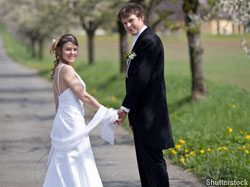
It’s your wedding day. You’ve been planning, organizing, booking locations, writing your vows, making guest lists, figuring out seating, coordinating outfits for the bridal party, tasting cake and entrees, and trying not to have a full-blown panic attack. There are literally 5,000 thoughts and emotions running through your body, and you are alternating between smiling uncontrollably and saying silent prayers that everything runs smoothly.
No matter how much planning you put into this day, though, none of it will be accurately remembered without pictures. That is why, despite the fact that every part of your ceremony and reception is equally significant, hiring the right wedding photographer is one of the most important decisions you’ll make.
Professional photography as a whole is an exciting and demanding profession requiring great adaptability, but wedding photographers in particular must be able to conform to their client’s exact needs. Each couple wants something different out of their wedding photographs, and it’s up to the photographer to capture the important moments just how the bride and groom want.
Photography is a fast-paced profession with little room for error, because often photographers have only seconds at a time to capture their shots. Wedding photographers are responsible for taking organized group photos of the wedding party, but they are also hired to take candid pre-ceremony and post-ceremony shots.
Accurately capturing the moments that take place on someone’s wedding day is clearly the most important task on a wedding photographer’s agenda. However, in addition to organizing and capturing the pictures themselves, wedding photographers must also:
* Have in-depth meetings with the bride and groom to understand exactly what kind of pictures they want taken, which moments need to be captured, what’s most important to them, etc.
* Research the venues that will be used for the ceremony and reception to get ideas for picture opportunities.
* Set up and take down the appropriate lighting and photography equipment at each venue.
* Prepare for both indoor and outdoor shots, and have a backup plan in case bad weather prevents outdoor shots from being taken.
* Produce collections of prints in the format that was decided upon.
Wedding photographers have a great deal of responsibility on their shoulders, but they also get the opportunity to capture important moments on some of the happiest days of people’s lives. It’s a demanding profession requiring patience, flexibility, creativity and precision, and at the end of the day it’s a position that can bring a great deal of joy to many people.
Information in this article was provided by Brooks Institute. Contact Brooks Institute today if you’re interested in developing marketable knowledge and career-relevant skills with an industry-current degree program. (Brooks Institute does not guarantee employment or salary.)





